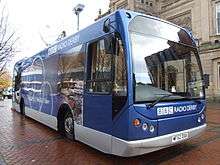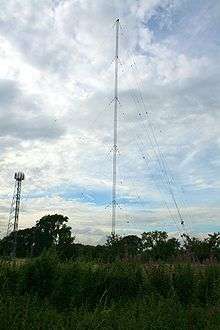BBC Radio Derby
 | |
| Broadcast area | Derbyshire and East Staffordshire |
|---|---|
| Frequency | RDS: BBCDerby, 104.5 FM, 95.3 FM, 96 FM, 1116 MW, DAB, Freeview channel 735 |
| First air date | 29 April 1971 |
| Format | Talk / News / Music |
| Language(s) | English |
| Audience share | 10.0% (March 2016, ) |
| Owner |
BBC Local Radio, BBC East Midlands |
| Website | BBC Radio Derby |
BBC Radio Derby is the BBC Local Radio station for the English county of Derbyshire, covering all but the northern tip of the county, and also serves eastern Staffordshire, mainly Uttoxeter and Burton upon Trent. The station broadcasts from its studios in Derby on 104.5, 95.3 (Stanton Moor, near Bakewell) and 96.0 (Buxton) FM and 1116 (Burnaston Lane, next to the Toyota factory) AM. It also transmits its programmes over the internet, and, as of 23 July 2014, broadcasts on DAB Digital Radio on the NOW Derbyshire DAB Multiplex.
Overview

BBC Radio Derby began broadcasting officially on 29 April 1971, though it went on air two months earlier than planned to cover the bankruptcy of the local aero-engine manufacturer Rolls-Royce. The station's logo was a Rams head in the late 1980s and early 1990s (as many other organisations in Derby have).
Much of the station's output is speech based, featuring news, sport, weather, travel, interviews, and discussions, mixed in with music and competitions. The station's primary audience is aimed at listeners aged over 45, though the sports and weekend shows attract a greater age range.
After 7 pm each weekday, Radio Derby simulcasts regional and networked programming with other BBC Local Radio stations until 1 am, when it simulcasts overnight output from BBC Radio 5 Live. BBC Radio Derby broadcasts match commentaries from local football teams; especially Derby County and Burton Albion. There is also extensive coverage of Derbyshire cricket during the summer.
The station won the prestigious "Station of the Year" award in the category for radio stations that serve between 300,000 and 1 million listeners at the Sony Radio Academy Awards in 2007, 2010 and 2011, becoming the first BBC local radio station to win it three times.[1] BBC Radio Derby was also named Station of the Year in the 2009 BBC local radio station Gillard awards.
Transmitters

104.5FM is the primary frequency for BBC Radio Derby, and comes from a 200 ft transmitting mast on Drum Hill, four miles north of the Derby City Centre, the other side of the A38 from Little Eaton, next to a Scout camp. This service used to come from the Sutton Coldfield transmitter. There is a transmitter for the Bakewell and Matlock areas based at Stanton Moor on 95.3 FM, and a relay of that frequency for the Buxton area on 96 FM. BBC Radio Sheffield is also clearly heard around Chesterfield with a dedicated relay station based in the town. Though in Derbyshire, Chesterfield and its surrounding area is officially catered for by Peak FM, Hallam FM or Radio Sheffield. Likewise, the north-western portion of the county taking in Glossop, Chapel, and Whaley Bridge is served by BBC Radio Manchester.
In addition, all of BBC Radio Derby's area is served via its medium wave service on 1116 kHz which comes from its transmitting mast at Burnaston, just south of the city, close to the Toyota car plant.
Capital FM East Midlands broadcasting on 102.8 FM also comes from the Drum Hill transmitter, as well as a local relay on 101.4 FM for the East Midlands regional station, Smooth FM. Stanton Moor also transmits the BBC national radio stations on FM and Peak FM on 102 FM (broadcast from Sheepbridge in Chesterfield on 107.4 FM). Buxton also has a television relay with regional programming from the North West and BBC national FM services, and High Peak Radio on 106.4 FM.
The station's main BBC National DAB transmitter is located in Quarndon, on the outskirts of Derby. A second transmitter, located in Lichfield, began operating in the early hours of 19 November 2014, in order to provide DAB coverage to the South Derbyshire and East Staffordshire areas. The third transmitter, located in North Derbyshire alongside the existing 95.3 FM transmitter at Stanton Moor, commenced operation in December of the same year. In addition, Digital One have a transmitter in Chesterfield. Services over most of the area come from the nearest BBC DAB transmitters at Sutton Coldfield and Waltham, plus Holme Moss in the north. North East Derbyshire and Chesterfield listeners can pick up intermittent reception of Yorkshire-based local and regional DAB services from a transmitter in Sheffield (Tapton Hill). A local Derbyshire DAB licence was advertised by OFCOM in January 2007, and has been awarded to "Now Digital" (with this Multiplex being known as NOW Derbyshire), with an "on air" date originally planned for July 2008, however this was delayed until July 2014.[2] In addition to commercial services, BBC Radio Derby will be transmitted on the multiplex from five transmitter sites of Chesterfield, Drum Hill, Tibshelf, Stanton Moor, and Lichfield. There are also long term plans for further transmitters at Buxton, Ashbourne, and Glossop.
It is also available through television (from the Waltham transmitter) on Freeview Channel 735.
Programming
The majority of the station's programming is produced and broadcast from Derby. During off-peak hours, BBC Radio Derby also carries regional programming for the Midlands and East Midlands regions, produced from sister stations BBC Radio Nottingham and BBC WM. As with all BBC Local Radio stations, it also airs the networked weekday evening shows, originating from BBC Radio Leeds and produced independently by Wire Free Productions. During the station's downtime, BBC Radio Derby simulcasts BBC Radio 5 Live overnight.
Notable past presenters
Colin Bloomfield Sun Meter
On Friday June 3rd 2016 Radio Derby unveiled the UK's first public UV meter in Markeaton Park.[3] It was a joint venture with the charity Skcin and was paid for with proceeds from the Colin Bloomfield Melanoma Appeal.
Money Mountain appeals
From 1983 until 2008, BBC Radio Derby held its annual 'Money Mountain' event. In later years this took place on the second Sunday of October; however it was originally held over the course of the entire weekend, and was presented from a marquee in the station's car park. This idea was abandoned a few years prior to the event's demise and all presenting took place inside the station building itself.
The idea of the event was to support local charities with donations from listeners. The day commenced with 'Dial a Hymn'; where listeners dedicated hymns to loved ones in exchange for a donation. This was then followed at 9am by an on-air auction which lasted until late in the evening. Lots typically consisted services by local companies (such as car valeting) and unique items (such as signed celebrity photographs, behind-the-scenes tours and home-made products).
In 2004, the amount of money raised over the years passed the one million pound mark. The person who pledged the bid to surpass this figure was rewarded with a cut glass trophy.
The 2008 auction was to be the last. Twenty-five years had passed since the first auction, and it was decided for the event to "go out on a high" in the anniversary year. The final lot was to win the actual gavel used during the auction over the years. This raised £350; the final total for the 2008 auction was £20,951.31, bringing the grand total over the twenty-five years to £1,121,010.31.
Branding
The station's jingles have varied greatly over the years as trends in music and technology have changed. In the mid-1980s, the station's slogan was "Rise and shine on 269!"; the '269' referring to the 269 metres wavelength of the 1116 kHz medium-wave frequency. This slogan formed the basis of many jingles in this era, but was phased out in the 1990s as the FM frequencies increased in popularity. Nowadays, mentions of the 269m wavelength are rare, with the presenters tending to simply mention the actual frequency of the medium-wave signal.
From the commencement of the 96FM frequency for the Buxton area until April 2008, the jingles were provided by Bespoke Music of Penryn, Cornwall (being exactly the same as Radio Wiltshire). They were then provided by Wise Buddah Productions of London. Now the generic Mcasso jingles are used.
References
- ↑ "BBC Radio Derby wins Sony Station of the Year award - BBC News". Bbc.co.uk. Retrieved 2015-04-25.
- ↑ "When will Radio Derby be on DAB?" BBC Radio Derby. 23 February 2011.
- ↑ http://www.bbc.co.uk/news/uk-england-derbyshire-36435396
External links
- BBC Radio Derby
- History of local radio in Derbyshire
- Old photocards from TellyTunes
- MDS975's Transmitter Map
- Burnaston Lane transmitter
- Buxton transmitter
- Drum Hill transmitter
- Stanton Moor transmitter
- David's Transmitter World
52°55′35″N 1°28′56″W / 52.92643°N 1.48209°WCoordinates: 52°55′35″N 1°28′56″W / 52.92643°N 1.48209°W